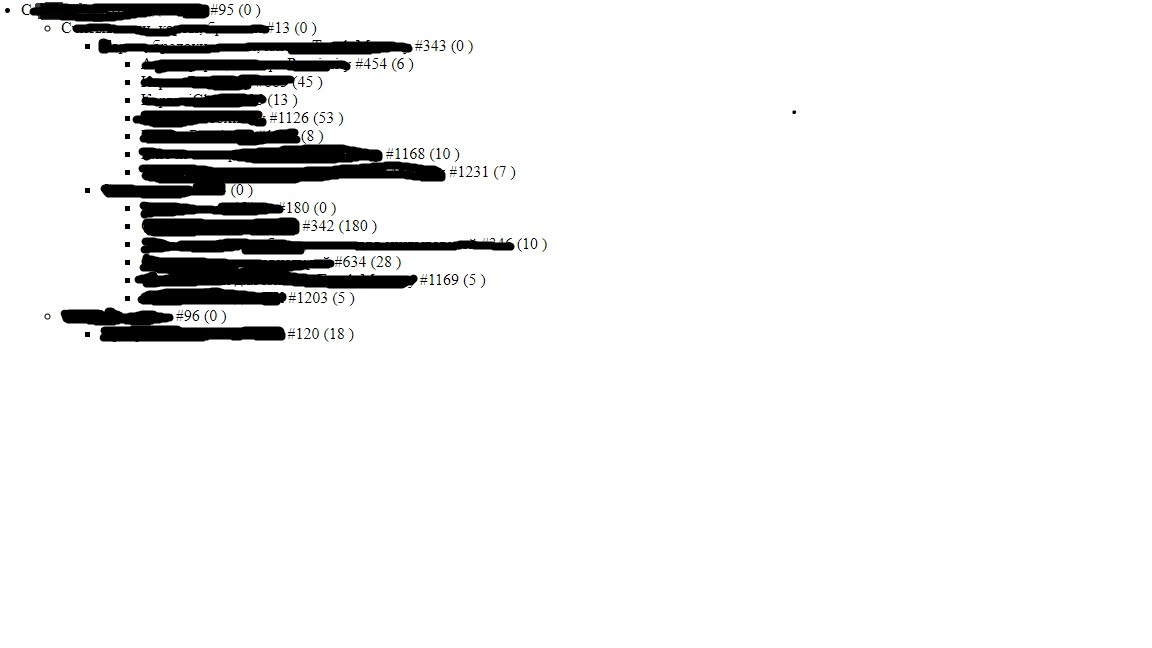Answer the question
In order to leave comments, you need to log in
How to display children in recursion?
Good day to all! Please tell a newbie, I am writing a menu for the admin panel, there is a menu with multi-level nesting, I did it through recursion, in the end, I wanted the sum of the final products in each subcategory to be displayed at each menu level, but I only display them in the final parent
$res1 = mysqli_query(DB::db(), 'SELECT id,name,pid FROM ve_category WHERE toshow1 = 1 AND toshow = 1');
$num = mysqli_num_rows($res1);
if ($num > 0) {
$cats = [];
while ($cat = mysqli_fetch_assoc($res1)) {
$req1 = mysqli_fetch_assoc(mysqli_query(DB::db(), 'SELECT COUNT(a.good_id) as cnt FROM ve_goods_images as a join ve_goods as b on a.good_id = b.id WHERE b.category = ' . $row['id'] . ' AND b.inprod = 0 AND ( a.width < 500 or a.height < 500 or a.width / a.height < 3/4 or a.width / a.height > 4/3 )'));
$cats_ID[$cat['id']][] = $cat;
$cats[$cat['pid']][$cat['id']] = $cat;
}
}
function build_tree($cats, $pid, $only_parent)
{
if (is_array($cats) and isset($cats[$pid])) {
$tree = '<ul>';
if ($only_parent == false) {
foreach ($cats[$pid] as $cat) {
$req1 = mysqli_fetch_assoc(mysqli_query(DB::db(), 'SELECT COUNT(a.good_id) as cnt FROM ve_goods_images as a join ve_goods as b on a.good_id = b.id WHERE b.category = ' . $cat['id'] . ' AND b.inprod = 0 AND ( a.width < 500 or a.height < 500 or a.width / a.height < 3/4 or a.width / a.height > 4/3 )'));
$tree .= '<li>' . $cat['name'] . ' #' . $cat['id'] . ' (' . $req1['cnt'] . ' )';
$tree .= build_tree($cats, $cat['id'], false);
$tree .= '</li>';
}
} elseif (is_numeric($only_parent)) {
$cat = $cats[$pid][$only_parent];
$res2 = mysqli_query(DB::db(), 'SELECT DISTINCT producer FROM ve_goods WHERE category= ' . $cats[$pid][$only_parent] . '');
$tree = '<ul class="nested">11';
while ($row1 = mysqli_fetch_assoc($res2)) {
$goods_producer = $row1['producer'];
$tree .= '<li><span class="caret">' . $goods_producer . '</span>';
$tree .= '</li>';
}
$tree .= '</ul>';
}
$tree .= '</ul>';
}
return $tree;
}
function find_parent($tmp, $cur_id)
{
if ($tmp[$cur_id][0]['pid'] != 0) {
return find_parent($tmp, $tmp[$cur_id][0]['pid']);
}
return (int)$tmp[$cur_id][0]['id'];
}
echo build_tree($cats, 0, find_parent($cats_ID, [95, 113, 117, 118, 164, 352, 530, 815, 816, 817, 818, 916, 1249, 1419, 1460, 1588, 1614, 1624, 1644, 1789, 1918]));
Answer the question
In order to leave comments, you need to log in
I propose to make the calculation of the number a separate function, and also with recursion. The option is not very good in terms of performance (there will be many queries to the database), but for lack of a better one, it will do. The scheme is something like this:
function countGoods ($catId) {
$result = ... // Здесь считаете количество товаров именно в этой категории
$children = ... // Здесь получаете список дочерних категорий
foreach ($children as $child) {
$result += countGoods($child['id']);
}
return $result;
}I tried to figure out what was what, but the code is noodles, of course. There are also some troubles with the pictures, which the author did not describe in any way.
This daunting task is definitely not solved by two queries?
SELECT category_id, COUNT(id) FROM goods GROUP BY category_idSELECT * FROM categories ORDER BY pid ASCDidn't find what you were looking for?
Ask your questionAsk a Question
731 491 924 answers to any question